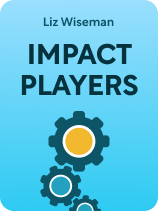

This article is an excerpt from the Shortform book guide to "Impact Players" by Liz Wiseman. Shortform has the world's best summaries and analyses of books you should be reading.
Like this article? Sign up for a free trial here.
What makes certain employees stand out as truly valuable in today’s fast-paced work environment? How can you become the type of worker who makes a meaningful impact beyond your job description?
Liz Wiseman says that impact players do more than just complete their assigned tasks. In her research, she reveals that the employees who make the biggest difference actively seek ways to contribute to their organization’s critical needs, even when those responsibilities fall outside their official roles.
Keep reading to discover how to be valuable at work by following Wiseman’s three recommendations.
How to Be Valuable at Work
Wiseman writes that impact players actively look for ways they can be of more use. Specifically, they identify and do the most valuable work, even if it’s outside of their job description. Wiseman discusses how impact players set themselves apart in this way in today’s work culture, and she shares her threefold advice on how to be valuable at work.
(Shortform note: Shouldering more responsibilities can help you increase your impact at work, but some argue that you shouldn’t overload yourself with so many tasks that you neglect self-care. In Working Hard, Hardly Working, Grace Beverley says that although self-care feels unproductive since you’re not doing work, it actually increases your productivity—it leaves you rejuvenated and primed to do your best when you are working. So, while identifying and taking on more valuable work, be sure to proactively schedule self-care time to maximize your ability to make an impact.)
Wiseman contends that the most important work an organization needs done often spills beyond the boundaries of specific job roles. This is because, in today’s world, work has become more complex and fast-paced due to technology and globalization. She writes that most workers haven’t adapted to this change and restrict themselves to the responsibilities they’ve been assigned. Because of this, they may work just as hard as impact players but fail to make as much of an impact because they don’t get involved in the most critical tasks for their organization.
(Shortform note: In Thank You for Being Late, Thomas L. Friedman says that thanks to technology, the world is changing quicker than we as a species can adapt. He explains that humans need 10-15 years to adapt to change, which wasn’t a problem a thousand years ago when big changes occurred every two to three generations. But, by 2016, the world was taking only five to seven years to be noticeably different. So, by the time we’ve adapted to something in this modern age, it will have already been replaced by something newer.)
To make the greatest impact, you should not only look beyond your job title but also your personal interests. Wiseman writes that impact players develop a passion for the work they have to do instead of doing only what they’re personally passionate about. She argues that the belief that following your personal passions leads to happiness at work is flawed—passions evolve and aren’t things that can be discovered through introspection. Instead, adapt your motivations to the needs of the organization and learn to love the work you have to do. This way, you can make meaningful contributions to your company and feel proud of your accomplishments which, in the end, leads to greater feelings of satisfaction.
(Shortform note: In Grit, Duckworth suggests you develop not just passion for your work but also a sense of purpose. She explains that purpose, or the desire to increase others’ well-being, helps your passion last over time. Without purpose, it can be hard to maintain your passion for long. Duckworth suggests three ways to develop purpose for your current work: First, reflect on how your work is making the world a better place. Second, think of how you can adjust your work practices to align more with your core interests and values. Third, find inspiration from a role model who’s devoted to serving others.)
To identify the critical needs of your organization and get involved, Wiseman suggests the following steps.
1) Identify broader organizational goals. To enhance your impact, you should always be working on your organization’s top priorities. Wiseman writes that these priorities change frequently and aren’t usually broadcasted in obvious ways, so regularly reach out to your team and your superiors to stay in the loop. To decide which goal to address first, identify your superior’s top three priorities and your organization’s top three priorities. Then, find where they intersect. For instance, if both your boss and your organization view team skill development as a priority, you might decide to contribute to a project that focuses on this.
(Shortform note: Administrative assistants share some more methods for staying informed about your organization’s priorities, apart from checking in regularly with your team and superiors. If your superior’s calendar and documents are public, review them regularly to get an idea of their priorities. You could also keep up with your superior’s emails or social media, as these channels can reveal their priorities or broader organizational trends. If possible, you could even attend your superior’s meetings by offering to take notes, for instance.)
2) Determine how you can contribute. Reflect on how your distinct skills can contribute to higher-level goals. For example, if you’re tech-savvy, you might offer to improve a software tool for training new team members.
(Shortform note: In The Effective Executive, Peter F. Drucker suggests you not only consider how to best use your distinct skills, but that you also consider how to maximize your boss’s skills. Helping your boss make better use of their skills makes them more successful, which is good for your success, too: They become better mentors and can better support your professional interests. To maximize your boss’s skills, understand how they best process information and then present issues in their preferred way. This allows them to apply their strengths to find a solution. For example, if your boss processes information better by reading rather than by listening, provide them with detailed written reports.)
3) Share your plans. Wiseman suggests you write a brief statement about how you can help your superior and your organization achieve their priorities. Your superior will appreciate knowing how your contributions fit into larger goals and that you’ll continue to do your regular tasks well.
(Shortform note: While as an employee, it’s good to proactively communicate your plans to contribute, Drucker argues that it’s the superior’s responsibility to get their employees to talk about their contributions. He suggests that superiors first share their own contributions and results and then ask employees to share the contributions they plan to make to create a productive two-way conversation.)
Exercise: Find Ways to Be More Valuable
Impact players distinguish themselves in their workplace by actively finding ways to be valuable beyond their designated roles. In this exercise, identify and act on opportunities within your organization.
- List the current top three priorities of your organization and your direct superior. If you don’t know what these priorities are, write down a plan for how you’ll find out.
- Determine where the priorities of your superior and the organization intersect. Identify at least one common priority and explain why it’s shared.
- Reflect on how your unique skills can contribute to the common priority.
- Write down a brief action plan for how you’ll address this priority. Include who you need to talk to, what resources you may need, and any initial steps you should take.
- Prepare a concise statement or proposal to present to your superior, detailing how you plan to contribute to the prioritized goals.

———End of Preview———
Like what you just read? Read the rest of the world's best book summary and analysis of Liz Wiseman's "Impact Players" at Shortform.
Here's what you'll find in our full Impact Players summary:
- How to become a star player at your workplace
- The three qualities of an impact player mindset
- Advice for creating an entire team of impactful employees






